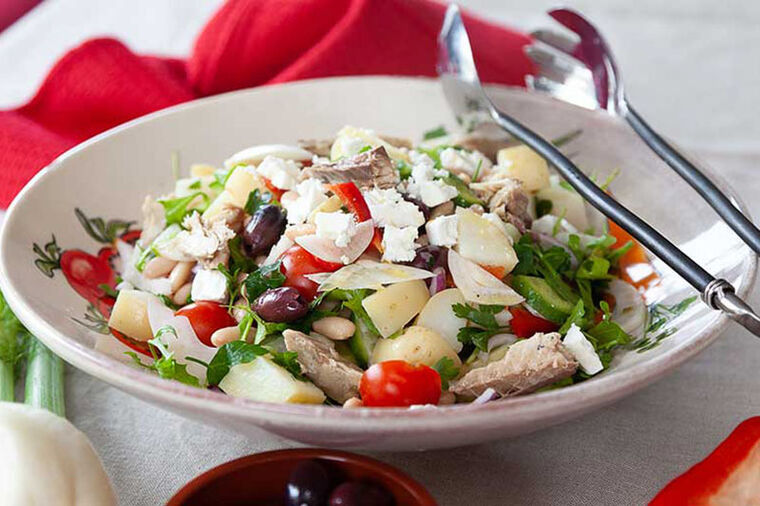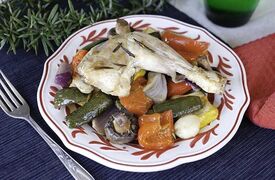Following the principles of the Mediterranean diet, this salad nourishes the gut and mind, and lets you swap ingredients depending on your preferences – and your pantry!
- L/D Lunch/Dinner
- GF Gluten free
- HH Heart-healthy
- GUT Gut-healthy
- Rainbow diet
- Prep time 15 mins
- Cook Time 15 mins
- Serves 2-3
- Difficulty easy

Method
- Steam the potatoes until tender. While still hot, place in a bowl with canned beans and garlic, chopped fresh herbs and a drizzle of extra virgin olive oil, which will help the herbs' flavours to infuse in the potatoes and beans.
- Meanwhile, chop all salad vegetables and wash and dry leafy greens.
- Add egg, or mackerel and its oil, then olives and feta. Add dressing and toss gently to combine.
- Salad can be stored in fridge and dressing added just before serving.
Nutritional information
By Jean Hailes naturopath and herbalist Sandra Villella
A key part of the traditional Mediterranean diet is the idea of eating to appetite – to eat when hungry, and not until feeling full. So, to support this approach, elements of mindfulness are included when people choose to follow a Mediterranean diet (known as an 'MD intervention') to help prevent, or reduce the effects of, chronic disease.
Mindfulness elements include eating with others, avoiding electronic devices and screen time during meals, and being more aware of what you are eating by slower eating, chewing thoroughly and understanding hunger and fullness cues.
The 12 components of a Mediterranean diet and how to live it
- Use extra virgin olive oil as the main added fat.
- Eat vegetables with every meal.
- Include at least two legume meals per week (baked beans on toast is an easy one).
- Eat at least three servings of fish or shellfish per week.
- Eat red meat less often and choose smaller portions. Choose white meat.
- Eat fresh fruit every day – 300g or two serves.
- Eat a serve (a handful) of nuts every day and dried fruit as a snack or dessert. Try walnuts with dried fig, or almonds with dried apricots.
- Eat two serves of dairy – preferably fermented – every day, including milk. One serve = 250mL (1 cup). Try sheep or goat's milk, as the Mediterranean diet features many alternatives to cow's milk.
- Eat cheese in moderation – about three times per week and preferably feta.
- Include wholegrain breads and cereals with meals, such as wholegrain bread, rice and pasta.
- Have sweets or sweet drinks in moderate amounts, only on special occasions and preferably home-made.
- Eat up to three eggs per week (free range or omega-3 varieties).




